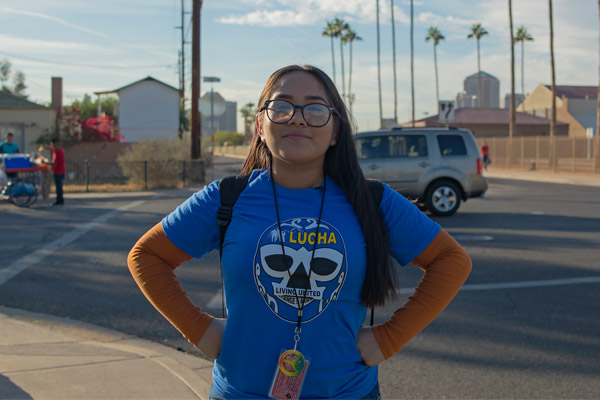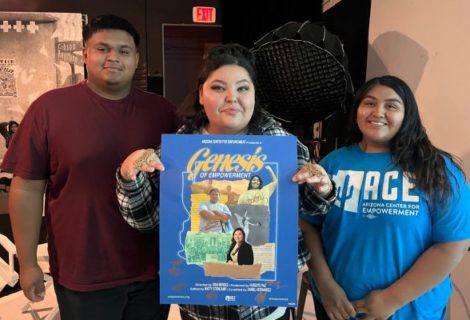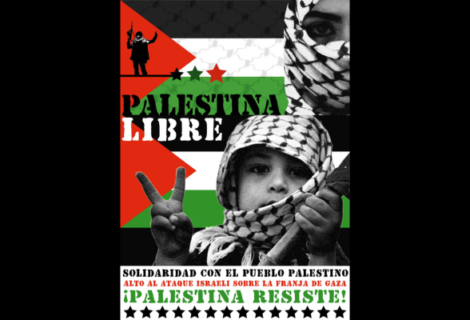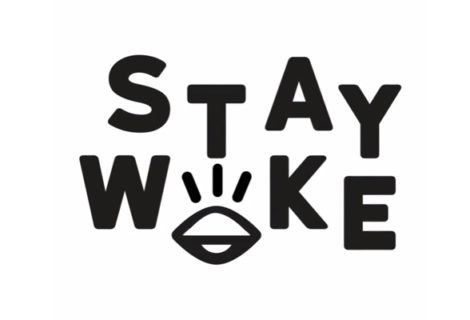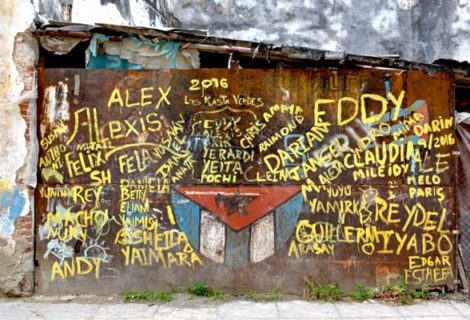LUCHA’s New Film Documents the Power of Our Community
For decades if not centuries, our stories have been in the hands of others. Whether it’s in textbooks, TV shows or film, the history of people of color has not been told by people of color or worse, it has not been told at all.
That is why the production of films like Tu Lucha es Nuestra Lucha, a short documentary released last week by the organization Living United for Change in Arizona (LUCHA) is so important.
The 8-minute documentary was produced by Abril Gallardo Cervera, one of the founders of the organization and currently its communications director. It was directed by Pita Juarez and the cinematography was done by Matty Steinkamp. The film was released in two sold-out shows at The Filmbar in the heart of La Phoenikera.
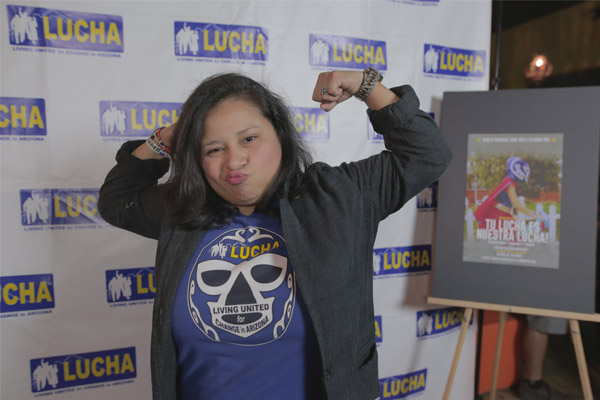
The film’s co-director Pita Juarez shows off her guns at the movie premier. Photo: Matty Steinkamp.
Tu Lucha es Nuestra Lucha tells a little bit of the story of LUCHA, a non-profit organization in the state that is most recently responsible for the passing of Prop 206, which increased the minimum wage to $10.50 per hour in January of this year and allows people to get paid sick time.
The film features testimonies by Alejandra Gomez and Tomas Robles Jr., LUCHA’s co-directors. It also involves volunteers Blanca Collazo (seen in this article’s feature photo), a DACA recipient whose grandfather was deported, Isaac Joeshua Tapia, a young man who qualified for DACA but for financial reasons could not apply before the program was terminated, and Armida Vargas, who went to LUCHA to take citizenship classes and ended up becoming a parent leader in the organization’s education justice program.
The film walks you through some of LUCHA’s work and accomplishments and how actively participating in the organization has turned its volunteers’ struggles into power.
“I had all these reporters coming to LUCHA wanting to tell the story of what’s happening,” says Abril Gallardo Cervera. “But I wanted to tell the story from the angle of our people, not from someone else’s eye.”
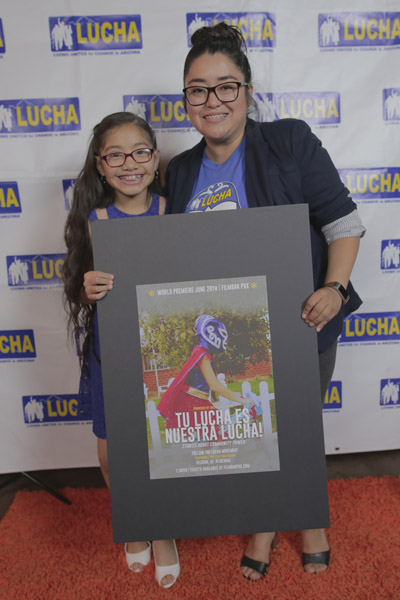
Abril Gallardo Cervera and Naiomy Gonzalez Mendez, who roams around La Phoenikera on her bike during the film. Photo: Matty Steinkamp.
Abril had the idea to do a presentation showing videos of people sharing what LUCHA meant to them, but after starting to shoot the videos, she realized those stories needed to be broadcast in a broader way for more people to see. After talking to Pita Juarez and what she says was “dreaming out loud,” the fleshed out idea of Tu Lucha es Nuestra Lucha came about.
“I wanted to tell the story of how people came together and formed a village to fight the issues they were facing. But I didn’t want the story to be about pain,” says Abril. “It’s important for us to share the resilience that comes out of the pain that some people go through.”
From a visual perspective, the film is successful. It’s shot simply and crisply, and it shows really cool shots of the city. According to Pita, they had a lot of footage from filming through the years. “It’s just being an activist and having a camera on us,” she says.
One of the best shots is the repeated appearance of a little girl riding her bike around a neighborhood while wearing a luchador mask.
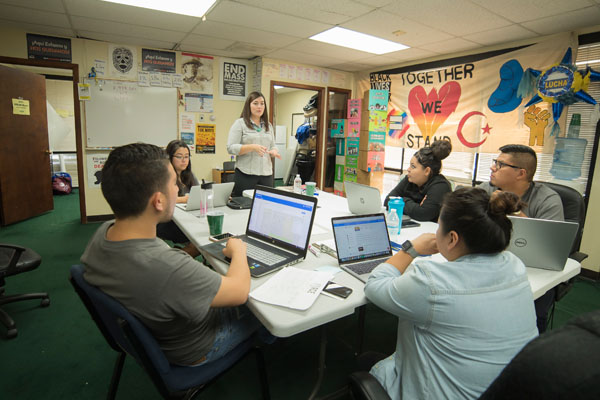
Mucha LUCHA under the leadership of Alejandra Gomez. Photo: Still shot from Tu Lucha es Nuestra Lucha provided by Matty Steinkamp.
From a storytelling standpoint though, we felt that we needed more. Though we hear about some of LUCHA’s landmark accomplishments and we get glimpses of the stories of three of its members, we don’t really get to see how the organization grew to become so powerful.
Knowing that LUCHA was built from the ground up by people who were directly affected by the broken immigration system and constant attacks on the migrant community, it would have been great to see that story on the big screen. More than anything to illustrate their trajectory to power for those who are hearing about LUCHA for the first time.
According to Abril, this is the first of a series of short documentaries LUCHA is going to produce. The next one, which is about to be released on the organization’s social media platforms, is a four-minute film with stories of people who have been positively impacted by the minimum wage increase brought about by Prop 206. Follow LUCHA – Living United for Change in Arizona to see it when it’s released.
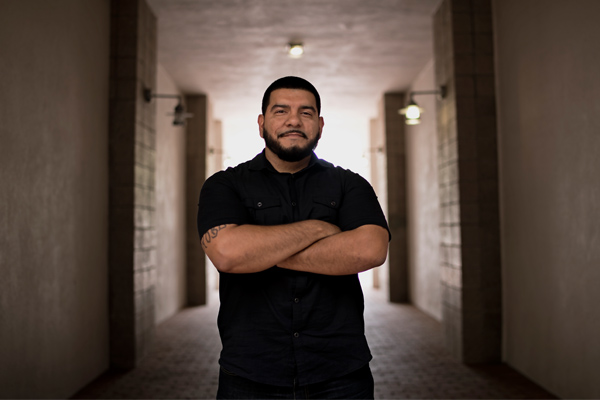
Tomas Robles Jr., co-director of LUCHA. Photo: Still shot from Tu Lucha es Nuestra Lucha provided by Matty Steinkamp.
Tu Lucha es Nuestra Lucha is an important contribution to the documentation of the migration story in this country, a lot of which is coming out of La Phoenikera.
This documentation started with films like Two Americans directed by Valeria Fernandez, SB1070: Los Rostros directed by the late Renato Avalos, The Immigration Paradox directed by Lourdes Vasquez and more recently You Racist, Sexist Bigot, directed by the same makers of Tu Lucha es Nuestra Lucha.
It is imperative that projects like these continue to be produced by people of color, especially those who are leading some of the most important social justice movements in the country.
If you want to see Tu Lucha es Nuestra Lucha, soon it will be on Amazon. We’ll keep you posted.

